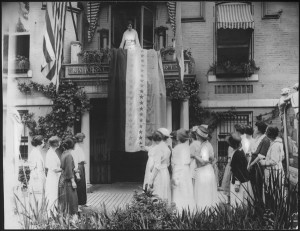Bad habits are hard to break, and sometimes the most we can hope for is to notice a little more quickly when we are falling into them. I had just such an experience this week with my revision of novel number five, THE INTUITIVE.
One of the main story elements involves the women’s suffrage movement. In the course of my research I came to admire deeply the “second generation” of suffragists, women like Alice Paul in the United States and the Pankhursts in England. I really had no ideas how much they endured to get me and all other women the vote. I wanted to do their story justice in my novel, but i was troubled by one thing.
Suffragist leaders were decidedly middle and upper class and almost exclusively white. This makes sense, for other women probably had more pressing things on their minds. What is not so easy to feel good about is the insistence, even by some of the suffragists I admire most, not to enlist people of color in the movement. Many people were uncomfortable with black men voting, and suffragists thought the cause would be hurt if it was pointed out that black women would get the vote too.
I’m sure Alice Paul and the others didn’t consider themselves racist, but simply practical. I’m not going to judge, but still it was something I thought my readers should know and have a chance to ponder for themselves. So I did what every novelist does–I work my interests into the novel through the thoughts and opinions of my characters.
Zorah Baldwin, my protagonist, has been introduced to the suffragist movement through meeting Alice Paul. After a parade in which she has been assaulted by paint-throwing protestors, she stands with Alice on the stage of Carnegie Hall, a symbol in her ruined dress, of the strength and determination of the movement. She should be amazed to be thrust in the spotlight in that way, pleased to be standing next to Alice, and feeling a growing commitment to the movement and greater sense of purpose in her life.
And what do I have her do? Thoughts pass through her mind about the fact that working women aren’t there because the parade was on a Saturday, which was a working day. She remembers a comment Alice made about not wanting black suffragist groups to march. In the middle of a fabulous scene, I just couldn’t resist stepping in to ruin it.
Okay, that might have worked out in the end, except that Zorah, over the next few chapters, makes a deeper and more passionate commitment to suffrage. My need to throw the negative in at the first opportunity disturbed the arc of the story, because both the reader and Zorah have already found the movement a bit off-putting. Why would she throw herself into it, and why should the reader cheer her on?
The whole story rang a little false now. Zorah could no longer be perceived the way I wanted her to be, if these serious issues were just passing thoughts she subsequently ignored. Nor did I want to write pages showing her struggle with this, just to work in some rationalizations for the reader.
I hadn’t re-read these pages in some time, and when I got to them, the answer was simple. “Get out of the way of the story!” I told myself. Let her just be thrilled and astonished standing on that stage in her paint-soaked dress. Let her have no doubts at all about the movement. The rest can wait–after all, this scene happens only halfway through the book. I just took out the material. I’ll find a way to work it in later, or maybe not.
I’ve been in wars with my books before. I wanted to write about the crazy excesses of Venetian convents so badly that I came up with a preposterous plot diversion in THE FOUR SEASONS to have Maddalena go live in one. Fortunately I caught myself before I’d spent much time and effort, and I’ve learned to accept that I am going to know a whole lot of incredibly interesting things that don’t end up being in my books.
Susan Vreeland has very aptly called such authorial indulgences “research dumps,” and the classism of the suffrage movement was just one of these. I catch myself more easily now throwing something in just because I know it, and I see this in other writers’ work as well. I guess I should think of research that isn’t dumped as one of the perks of writing a historical novel. It’s all still in my head for me to ponder and for readers to discover if my work inspires them to learn more on their own.

